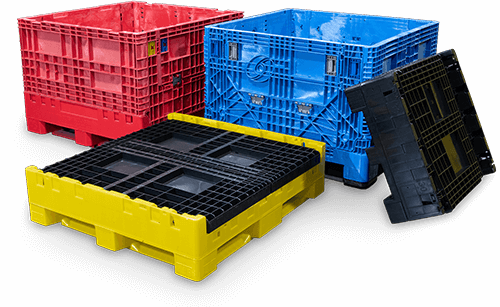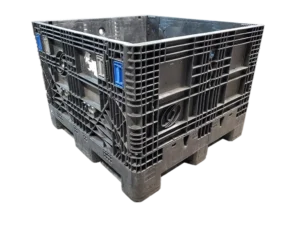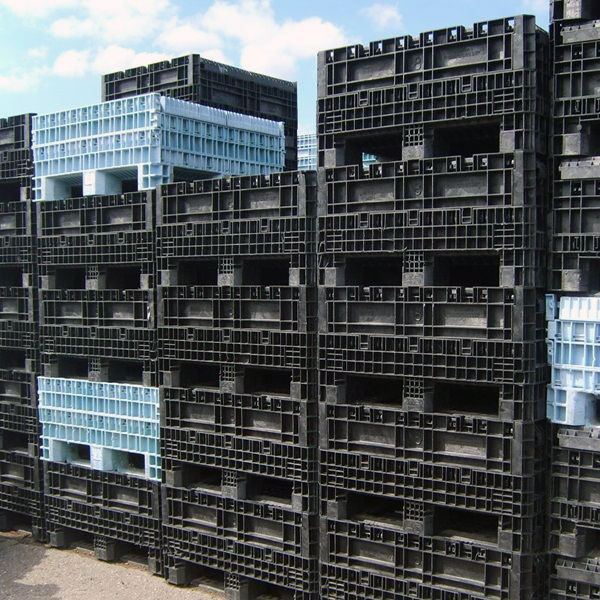Why Mass Containers Are Important for Affordable and lasting Transport
Bulk containers play an important function in modern logistics. They help with the effective motion of large amounts of items, therefore maximizing transportation processes. This method not just reduces costs however also reduces environmental impact through reduced exhausts and waste generation. As sectors look for more sustainable practices, the adoption of mass containers is becoming increasingly substantial. What ramifications does this change hold for future logistics and supply chain monitoring?

The Advantages of Using Mass Containers in Logistics
Bulk containers transform logistics by enhancing performance and sustainability. These containers enable the transport of huge quantities of items in a single trip, noticeably minimizing the variety of journeys called for. This not only streamlines procedures yet additionally reduces labor costs linked with handling, packing, and unloading. On top of that, bulk containers are made to enhance space application within transportation cars, ensuring that even more items can be delivered simultaneously.
The standardization of mass containers additionally simplifies the logistics process. With uniform measurements, they can be easily stacked and kept, causing enhanced storage facility administration. Additionally, bulk containers typically include long lasting materials that shield components from damages throughout transportation, thereby lowering product loss and boosting general reliability. Consequently, services can experience boosted supply chain performance, inevitably bring about raised earnings and consumer complete satisfaction. This mix of aspects makes mass containers a crucial asset in contemporary logistics.
Ecological Impact: Minimizing Waste and Carbon Impact
As industries significantly focus on sustainability, the adoption of mass containers has emerged as an essential approach for reducing waste and reducing carbon footprints. These containers reduce using packaging products, such as boxes and plastic, therefore notably reducing general waste generation. By combining shipments, mass containers enhance transport effectiveness, permitting even more products to be transported per journey. This decrease in trips directly correlates with reduced greenhouse gas emissions, adding to a smaller carbon impact.
Mass containers can commonly be reused or reused, even more reducing ecological influence. The toughness of these containers assurances they can hold up against several transportation cycles, minimizing the demand for single-use alternatives. used plastic containers. By enhancing logistics and promoting effective resource usage, bulk containers not just sustain lasting practices yet likewise encourage sectors to straighten with international ecological objectives. Eventually, their implementation mirrors a commitment to ecological stewardship and liable resource monitoring
Cost Cost Savings: Just How Mass Containers Lower Transportation Expenditures
While lots of business look for ways to improve their profits, the use of mass containers provides a substantial opportunity for reducing transportation costs. Bulk containers optimize the quantity of items transported, permitting organizations to deliver larger amounts at as soon as. This effectiveness lowers the variety of trips required, straight reducing fuel prices and decreasing labor expenditures connected with loading and unloading.
Furthermore, bulk containers usually feature structured styles that optimize space utilization within transportation lorries. This means fewer empty rooms, causing a lot more efficient use of readily available capacity. The resilience of bulk containers can lower the risk of product damage throughout transportation, minimizing losses and making sure that even more items show up intact.
Enhancing Supply Chain Performance With Mass Storage Space Solutions
Bulk storage space remedies play a crucial duty in boosting supply chain efficiency by optimizing supply administration. By combining goods into fewer, larger containers, services can greatly decrease taking care of prices associated with frequent transfers and handling. This streamlined method allows for better tracking and monitoring of supply, eventually leading to improved operational efficiency.
Streamlined Supply Management
Efficient supply management is essential for maximizing supply chain procedures, particularly when organizations embrace bulk storage services. These services enable organizations to maintain greater supply levels while lessening the regularity of replenishment. By settling materials right into bulk containers, firms can simplify their stock processes, lowering the complexity linked with tracking multiple smaller bundles. This strategy helps with exact supply counts and boosts forecasting precision, permitting even more educated decision-making. On top of that, mass storage space solutions simplify storage facility company, making it easier to locate and access items when needed. Therefore, organizations can achieve an extra effective inventory turnover price, eventually improving overall supply chain performance and decreasing the possibility of stockouts or overstock situations.

Decreased Handling Prices
The execution of mass storage space solutions not only simplifies supply monitoring but likewise considerably lowers dealing with expenses across the supply chain. By settling products into bulk containers, companies decrease the demand for frequent handling and transfer in between different storage and transport units. This technique cuts down on labor prices related to loading, discharging, and relocating smaller sized plans. In addition, mass storage space lowers the frequency of shipments, resulting in reduced transportation costs and reduced fuel usage. Therefore, services can maximize their logistics procedures, enabling a much more reliable allotment of sources. Eventually, minimized managing expenses contribute to enhanced general supply chain effectiveness, promoting a setting that sustains both sustainability and economic practicality.

Adaptability of Mass Containers Across Numerous Industries
Although lots of markets have distinct requirements for transportation and storage space, bulk containers have become a functional service that fulfills a variety of demands. These containers, ranging from huge containers to specialized containers, can accommodate diverse materials, including granules, fluids, and powders. In the agricultural industry, bulk containers assist in the transport of grains and fertilizers, while the food and beverage industry utilizes them for active ingredients and ended up items. The chemical market depends on bulk containers for safely carrying unsafe products, ensuring conformity with safety laws. In addition, building and construction firms gain from mass containers for transporting aggregates and various other products. Their versatility reaches various settings of transportation, including ships, trains, and trucks, enhancing logistical performance. This adaptability not only streamlines procedures across various markets however also advertises sustainability by lowering packaging waste and maximizing room in transit. Mass containers play a crucial function in contemporary supply chain monitoring.
Future Fads in Bulk Container Usage and Sustainability
The future of mass container use is increasingly shaped by cutting-edge products growth that improves sustainability. Furthermore, automation in logistics promises to enhance operations, reducing waste and enhancing efficiency. Accepting round economic situation practices will additionally revolutionize how bulk containers are made, used, and recycled, cultivating a more sustainable transport landscape.
Cutting-edge Materials Development
As markets increasingly prioritize sustainability, cutting-edge materials growth in bulk containers arises as a significant consider enhancing environmentally friendly transport solutions. Manufacturers and researchers are discovering biodegradable plastics, recycled composites, and lightweight metals to lower environmental impact. These materials not just reduce waste however also boost fuel effectiveness by reducing the general weight of containers. Furthermore, advancements in smart products, which can adjust to differing problems, improve the longevity and functionality of mass containers. The assimilation of these cutting-edge products lines up with round economic climate concepts, promoting reuse and recycling. As the demand for sustainable practices expands, the growth of such products will certainly play an essential role fit the future of bulk container usage in logistics and transportation.
Automation in Logistics
Substantial advancements in automation are poised to change logistics and the use of bulk containers, improving sustainability in transportation. Automated systems, consisting of drones and independent automobiles, are enhancing the motion of bulk containers, decreasing the reliance on traditional fuel-powered transportation. These modern technologies optimize transmitting and filling procedures, enhancing and decreasing empty miles gas effectiveness. Additionally, automated supply administration systems improve tracking and tracking of bulk containers, making certain much better resource allotment and decreased waste. The integration of the Net of Points (IoT) allows real-time information evaluation, allowing proactive decision-making that straightens with sustainability goals. As automation proceeds to develop, it is anticipated to drive even more innovations wholesale container use, eventually supporting more lasting logistics practices and lowering the environmental influence of transport.
Circular Economic Situation Practices
Advancements in automation are establishing the phase for a much more integrated approach to round economic climate practices in the domain of bulk container usage. As industries progressively accept sustainability, mass containers are being developed for longevity and reusability. This change not just lessens waste but likewise enhances resource performance. Firms are embracing approaches such as closed-loop systems, where used containers are gathered, reconditioned, and reestablished right into the supply chain. Additionally, smart modern technologies track container life cycles, promoting better administration and lowering environmental impact. The collaboration between producers, logistics providers, and end-users is vital in developing criteria for lasting container use. used bulk containers. Future patterns show an expanding focus on products that are eco-friendly and recyclable, more enhancing the circular economy's principles in bulk transportation

Often Asked Questions
What Products Are Mass Containers Usually Made From?
Mass containers are commonly constructed from durable materials such as high-density polyethylene, steel, aluminum, and cardboard. These materials provide versatility, protection, and strength, making them suitable for carrying various goods in different industries efficiently.
Exactly how Do I Choose the Right Size Bulk Container?
Choosing the right dimension mass container entails evaluating the volume of materials to be transferred, considering dealing with equipment compatibility, and appraising storage room needs. Correct dimension assurances effectiveness in transportation and minimizes waste throughout delivery.
Are Mass Containers Reusable or Recyclable?
Bulk containers are frequently reusable, made for numerous trips, enhancing sustainability. Numerous can also be reused, depending on the products utilized. Choosing recyclable alternatives additionally reduces and sustains environmental objectives waste in transport techniques.
What Safety And Security Rules Relate To Bulk Container Transportation?
Security regulations for mass container transportation consist of compliance with the Division of Transportation standards, appropriate labeling of hazardous materials, structural honesty evaluations, and adherence to weight limits to ensure safe handling and stop accidents throughout transit.
Exactly How Can Businesses Shift to Using Mass Containers Effectively?
Organizations can transform to bulk containers by reviewing present logistics, educating team on handling, investing in ideal devices, maximizing supply management, and collaborating with vendors to ensure compatibility and effectiveness throughout the supply chain.
As sectors significantly prioritize sustainability, the adoption of mass containers has arised as a key technique for decreasing waste and reducing carbon footprints. By consolidating materials right into bulk containers, companies can improve their stock click here procedures, lowering the complexity connected with tracking several smaller sized plans. As sectors increasingly prioritize sustainability, innovative materials advancement in mass containers arises as a substantial element in boosting eco-friendly transportation services. Automated systems, including drones and self-governing automobiles, are simplifying the activity of mass containers, lowering the dependence on traditional fuel-powered transport. Additionally, automated inventory management systems enhance tracking and monitoring of mass containers, ensuring better source appropriation and lowered waste.